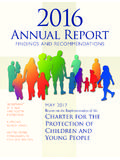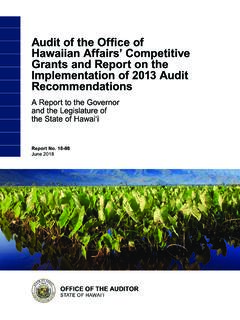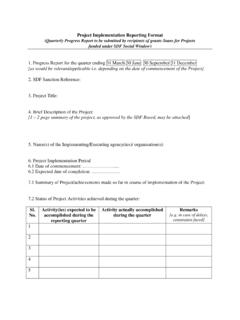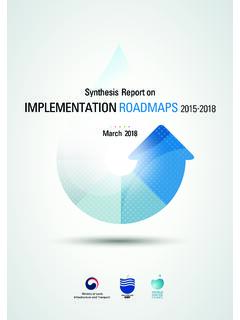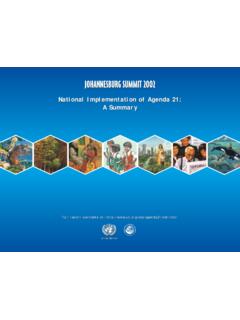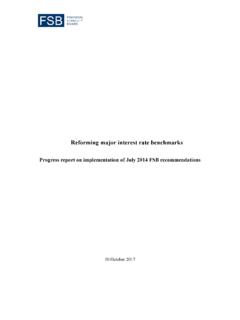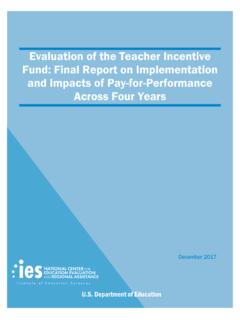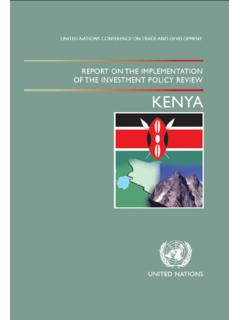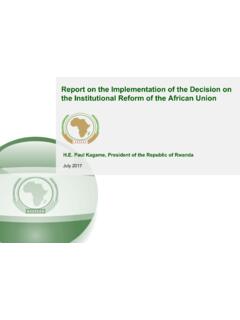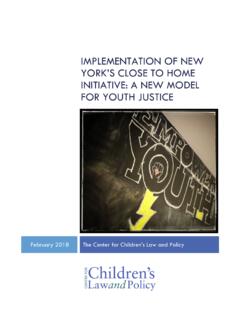Transcription of BEREC Report on the implementation of ... - mlex.com
1 BoR (17) 240 7 December 2017 Report on the implementation of Regulation (EU) 2015/2120 and BEREC Net Neutrality Guidelines BoR (17) 240 1 Contents 1 Summary and conclusions .. 2 Summary .. 2 Conclusions .. 3 2 General Questions .. 4 3 Article 3 .. 6 Article 3(1) and 3(2) commercial and technical conditions related to the provision of Internet access services .. 6 Article 3(3) traffic management .. 10 Article 3(4) data protection in traffic management .. 15 Article 3(5) specialised services .. 16 4 Article 4(1) .. 18 Approach to monitoring and enforcing compliance .. 18 Formal assessments of contract conditions .. 19 Specifications on speeds .. 19 Definition of speeds in contract terms and conditions.
2 21 5 Article 4(2) procedures for end-user complaints .. 23 6 Article 4(3) additional transparency requirements .. 25 Monitoring end - user complaints .. 27 Remedies for consumers .. 28 IAS quality monitoring mechanism for consumers .. 29 7 Article 5(1) QoS requirements .. 31 Measurements of IAS quality .. 31 8 Article 6 Penalties applicable to infringements .. 34 9 Conclusions .. 35 Annex I: Abbreviations for countries .. 36 BoR (17) 240 2 1 Summary and conclusions Summary This Report gives an overview of the activities of the NRAs1 under the implementation of the net neutrality provisions of Regulation (EU) 2015/21202 and associated BEREC Net Neutrality Guidelines. This Report reflects the first year of application of the Regulation: 30 April 2016 to 30 April 2017.
3 BEREC has gathered information from 30 NRAs via an internal questionnaire. NRAs also published in national reports on the first year of application of the Regulation. To this information, descriptions of publicly known net neutrality cases or investigations have been added. These cases arose between April 2016 and October 2017. Therefore, this Report does not constitute an exhaustive account of the current actions in the field of net neutrality, as several ongoing cases and actions cannot be mentioned due to the confidentiality issues. The information in this Report is organized according to the provisions of the Regulation. This Report shows that NRAs have demonstrated an active implementation of the Regulation, while it is still early to come to definite conclusions. For example, on zero rating cases, the majority of the NRAs have undertaken some activity in the first year.
4 A handful of formal decisions were reached. More formal decisions are expected to follow during the remainder of 2017. Concerning Article 3 of the Regulation regarding end-users rights to open internet access, the analysis of complaints or end-user reports, information requests to ISPs and market surveys without requesting information from ISPs ( checking ISP s offers on their web pages) were the most mentioned activities among NRAs. All NRAs indicated they were monitoring the commercial and technical conditions related to the provision of internet access services, with the majority combining two or more of surveys, analyses of complaints and information request to ISPs. Zero-rating offers were identified by 25 NRAs, with music and social networking the most frequently mentioned types of applications being zero-rated.
5 Traffic management practices were assessed formally only by a small number of NRAs. According to the NRAs, monitoring activities are going on for investigating so-called specialized services . Concerning Article 4 on transparency and contractual terms, most of the NRAs have started with different activities including formal and informal requests for information from the ISPs and market surveys without requesting information from ISPs. End-users reports and complaints are also a very good source for the NRAs when conducting an assessment. 16 NRAs already prepared national specifications in relation to the different types of speeds information required under Article 4 maximum, normally available and minimum speed. Even though the Regulation has been in place for more than a year now, there are still 1 NRA is used in this Report as reference to the National Regulatory Authority in the meaning of Article 5(1) of Regulation (EU) 2015/2120 as they have been designated by the national legislator.
6 These do not fully correspond to the NRAs that are BEREC members and observers. See Question 1 below. 2 This Report refers as the Regulation to the net neutrality rules contained in Regulation (EU) 2015/2120 of the European Parliament and of the Council of 25 November 2015 laying down measures concerning open internet access and amending Directive 2002/22/EC on universal service and users rights relating to electronic communications networks and services and Regulation (EU) No 531/2012 on roaming on public mobile communications networks within the Union. BoR (17) 240 3 countries where ISPs have not yet included speed information in the contracts. A great majority of the NRAs monitor end-user complaints about the performance of the IAS. Half of the NRAs offer an IAS quality monitoring mechanism to consumers.
7 Concerning Article 5 the answers to the questionnaire indicated that a large majority of NRAs is monitoring the availability of high speed IAS, either by market surveillance without requesting ISPs, by requesting information from ISPs, by conducting IAS speed measurements and/or by analyzing complaints and end-user reporting. Conclusions This Report shows a consistent treatment by NRAs of practices relating to the core principles of net neutrality, such as the ban on blocking of applications and discriminatory treatment of specific traffic. The Regulation neither allows nor prohibits certain commercial practices per se. The zero-rating cases mentioned in this Report illustrate that it is key to analyze the specifics details of the practice concerned and its circumstances. To this end, BEREC Net Neutrality Guidelines set out a number of criteria against which zero rating needs to be assessed.
8 Striving for a coherent application of the Regulation, BEREC facilitated the exchange of information and knowledge both at the level of Net Neutrality expert working group and in Plenary meetings during 2017. BEREC will continue this work in 2018. Overall, BEREC concludes that the Regulation has been implemented by NRAs with adequate coherence. During the first year of the entry into force of the Regulation, the first cases were decided upon by NRAs. At the time of writing of this Report , also quite a number of cases is being analyzed by NRAs. BEREC concludes that in analyzing cases, NRAs coordinate and exchange information on ongoing cases via the BEREC Expert Working Group. This is contributing to a coherent application of the Regulation. BEREC concludes so far that the Net Neutrality Guidelines are well suited to assist NRAs in performing their tasks of supervision and enforcement as set out in Article 5 of the Regulation.
9 As noted above, NRAs are in the process of gathering experience with the first cases, and still need to gather further experiences in order to be able to evaluate the Net Neutrality Guidelines. At the same time, no cases have appeared in which the Net Neutrality Guidelines themselves were insufficient. BEREC notes that the evaluation of the Regulation (EU) 2015/2120 by the Commission will be conducted by 30 April 2019. Therefore, late 2018 BEREC will provide the Commission with an evaluation Report on its experience with the application of the Regulation and the Guidelines. BoR (17) 240 4 2 General Questions Question 1. Which authority or authorities are responsible for enforcing the Regulation (EU) 2015/2120? (If there is more than one authority, please identify the aspects of the Regulation for which each is responsible.)
10 The majority of the NRAs answered that they are fully responsible for enforcing the Regulation (19: AT, BG, HR, CZ, DK, DE, HU, IS, IE, LU, LT, LV, NO, PT, SK, SI, SE, NL and UK)3, in other cases NRAs share this responsibility with other authorities: Data Protection Authority for implementation of Article in 7 (CY, FI, ET, IT, MT, RO and UK) member states; the Competition and/or Consumer Protection Authority for implementation of Articles and in two member states, FR and PL, Media regulators for implementation of Article in 1 member state (BE) and Consumer Protection Authority for implementation of Articles in one member state (RO). In ES, the Ministry of Energy, Tourism and the Digital Agenda is the main body entrusted with the responsibility of enforcing the Regulation. However, CNMC is in charge of dispute resolution on NN issues between operators and other entities that can benefit from access and interconnection obligations ( CAPs).


